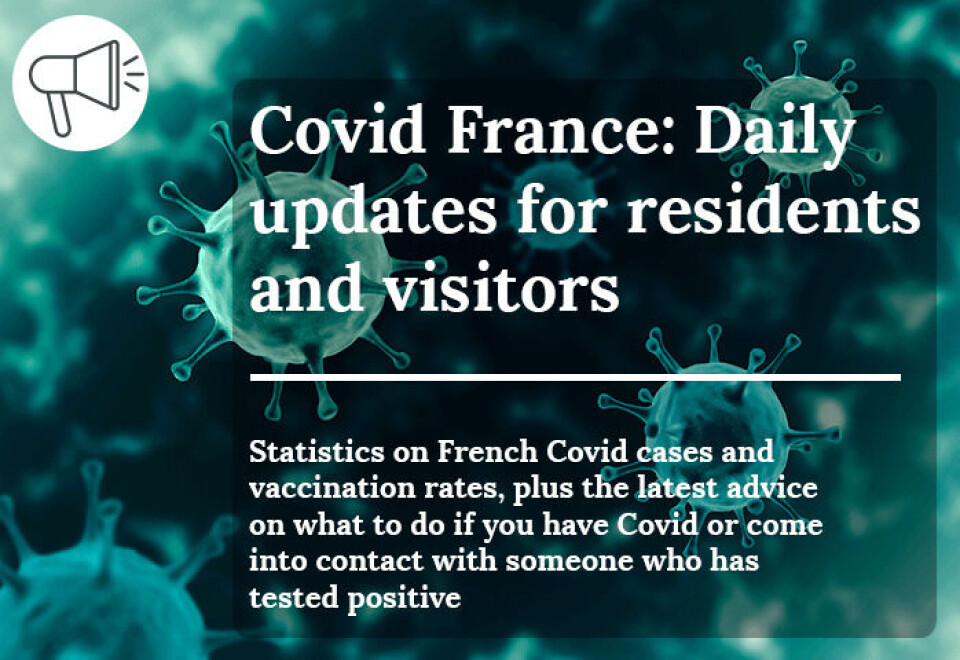-
How many Americans live in Paris - and where else are they choosing in France?
Over a quarter of all US nationals in France live in the capital city
-
Price rises for Netflix in France
The Standard (with ads) and Premium packages are increasing by €24 a year
-
Leclerc supermarkets to sell car fuel at cost price for Easter
The initiative will apply to diesel, petrol, and LPG
Covid: Daily updates on the situation in France
How many recorded new cases are there? Who in France can access a fourth vaccine dose? How is the vaccination campaign progressing? We explain

Latest statistics on Covid in France
Situation on March 03, 2023, the latest official statistics available recorded at 14:00
- Recorded new cases in France in previous 24 hours: 3,194 (-18,5% in comparison with 7 days ago)*
- Rate of positive tests: 6,7%*
- Number of people having received at least one Covid-19 vaccine dose: 54,659,294 (+190 in the 24 hours to March 01 the date of the latest update)**
- Number of people having received three doses: 37,887,372 (+524 in the 24 hours to March 01, the date of the latest update)**
*Data provided by santepubliquefrance.fr and **CovidTracker.fr
The rate of positive tests is the number of positive tests divided by the total number of tests over the past seven days.
More information on the vaccine campaign against Covid-19 in France
How to book your Covid-19 vaccination appointment in France
How to get a Covid recovery certificate in France and as a tourist?
How many people have received the vaccine in France?
More than 54 million people have received at least a first dose of a Covid vaccination. This accounts for more than 81% of the population in France.
Everyone over the age of five can be vaccinated in France. Children are being given doses adapted specially for their age group.
Covid booster vaccines have been rolled out across France for all people aged over 12.
Only the Pfizer and Moderna vaccines are being used for booster doses. Moderna is only being given to people aged 30 and over and is the vaccine normally used for people in this age group.
To be eligible for a booster dose you must be:
- Over 12
- Fully vaccinated, with the last dose having been given at least three months ago (four weeks ago in the case of the single-shot Janssen vaccine)
- Those who have only had one vaccine dose because they have previously contracted Covid may get a booster dose from three months after their initial vaccination or Covid infection
There are no vaccine or health pass systems in place so people do not need to show proof of vaccination or of a negative Covid test result in order to enter different venues.
Who can get a fourth vaccine dose & the specialised Omicron vaccine?
France began rolling out a special booster dose targeting the Omicron variant of Covid on October 3. This is primarily aimed at at-risk patients, but anyone can get one.
Read also: New Covid vaccine campaign to begin for at-risk groups in France
Read also: RECAP: France’s booster campaign with ‘new’ Covid vaccines launches
The groups being prioritised are:
- People aged over 60
- Residents of care homes (Ehpad and Unités de soins de longue durée (USLD)
- People aged at least 18 and at risk of developing a serious form of Covid (those who have weakened immune systems, pregnant women, those with serious long-term health conditions…)
- People living with/in close contact with the vulnerable people in the point above
- Health professionals
Eligible people are being encouraged to have both this Covid booster and their annual flu jab at the same time, one in each arm.
Read also: Who will be included in France’s new Covid vaccine recommendation?
What are the rules around Covid tests in France?
Testing costs
Since March 1 2023, the majority of tests for Covid-19 are no longer covered 100% by social security.
Tests carried out by nurses will, for example, be covered only up to 60% of the costs by French social security, and tests by doctors and pharmacists 70%.
Certain groups, such as high-risk individuals and those with a long-term illness, will still have the full cost of any Covid test paid for.
This includes those with a declared long-term condition, over 65s, adolescents plus children, and professionals in the medical sector among others.
Complementary (top-up) health insurance will also pick up much of the remainder for those who have this.
Read more: Reimbursement rules for Covid tests in France change from March 1
Self-isolation
Systematic and obligatory isolation for people who test positive is no longer required (although it is still recommended).
Read more: New rules for Covid-19 in France: Testing, contact cases, isolation
Contact cases
Contact cases no longer have to do a Covid test two days after being identified as a contact. The test and trace teleservice Contact Covid is also no longer in operation.
Time off work pay
The waiting period before the payment of daily sick pay allowances in case of Covid infection has been re-introduced. The payments are no longer automatic, as stated in the Journal Officiel on January 28.
What are the rules for wearing masks in France?
Masks are not mandatory in outdoor settings. However, people entering health and care settings such as hospitals are still advised to use a face covering.
They are not required on public transport.
Read more: Wear masks around the at-risk and on transport, says PM
























